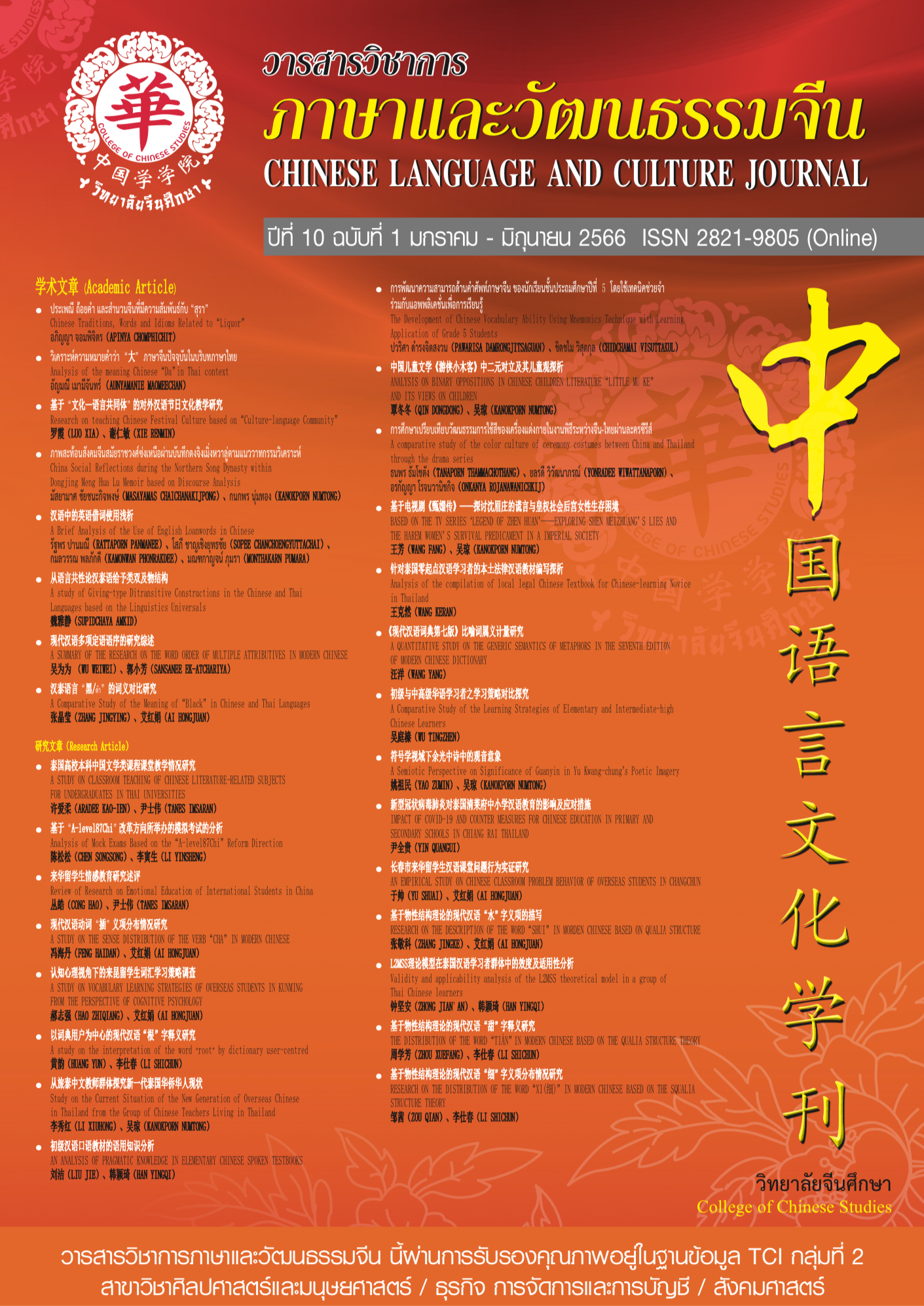วิเคราะห์ความหมายคำว่า“大”ภาษาจีนปัจจุบันในบริบทภาษาไทย
คำสำคัญ:
การเปลี่ยนแปลงความหมาย, อรรถศาสตร์, ภาษาจีนในบริบทภาษาไทยบทคัดย่อ
ภาษาและวัฒนธรรมที่ต่างกันส่งผลให้การเลือกใช้คำศัพท์ในการแสดงความหมายสิ่งเดียวกันมีความแตกต่าง การเปลี่ยนแปลงทางด้านความหมายของภาษาทั้งการเพิ่มขึ้นและตัดทอนความหมายก็มีอยู่ตลอดเพื่อตอบสนองความต้องการในการสื่อสารของมนุษย์ผู้ใช้ภาษา บทความนี้จะกล่าวถึงการวิเคราะห์ความหมายของ“大”ในภาษาจีนปัจจุบันทั้งความหมายตรงและความหมายขยายออก โดยรวบรวมข้อมูลจากฐานข้อมูล Center for Chinese Linguistics PKU วิเคราะห์ความหมายในบริบทต่างๆ คำว่า“大”เมื่ออยู่ในบริบทของภาษาไทย พบว่ามีการเลือกใช้คำที่หลากหลายขอบเขต สำหรับขอบเขตความหมายที่ภาษาไทยและภาษาจีนใช้ตรงกันกับคำว่า“ใหญ่”มีเพียงแค่ 4 ขอบเขตความหมาย ได้แก่ 1)บอกขนาดของวัตถุ 2)บอกเรื่องราวข่าวสารว่าเป็นเรื่องที่ไม่ธรรมดา 3)ใช้กับคนแสดงความหมายถึงคนที่มีอายุมากกว่า 4)ใช้กับลำดับของลูกแสดงความหมายถึงคนที่เกิดคนแรก นอกเหนือจากขอบเขตความหมายเหล่านี้ ภาษาไทยไม่ได้ใช้คำว่า“ใหญ่”ในการแสดงความหมายแต่ได้ใช้คำอื่นแทน เช่น แรง ดัง หนัก สำคัญ หนา มาก หรือแม้แต่ไม่สามารถหาคำมาเทียบเคียงให้ตรงกับความหมายในบริบทนั้นๆได้แทน
เอกสารอ้างอิง
นริศ วศินานนท์. (2559). การศึกษาเปรียบเทียบการกลายความหมายของคำในภาษาจีนและภาษาไทย.หนังสือรวมบทความการประชุมวิชาการด้านจีนศึกษาของมหาวิทยาลัยหัวเฉียวเฉลิมพระเกียรติครั้งที่ 1 ปี2559.หน้า19-29.
นริศ วศินานนท์และสุกัญญา วศินานนท์. (2564). การเปรียบเทียบระบบความหมายของคำในภาษาจีนและภาษาไทยจากคำกริยาพยางค์เดียวที่มีความหมายเกี่ยวกับการมองดู.วารสารภาษาและวัฒนธรรมจีน.2564.หน้า27-39.
ราชบัณฑิตยสถาน. (2556).พจนานุกรม ฉบับราชบัณฑิตยสถาน พ.ศ. 2554. พิมพ์ครั้งที่ 8 กรุงเทพมหานคร : นานมีบุ๊คส์.
J, Y.D. (1999). Chinese Character Semantics. Beijing: Peking University Press.
Lu, S.X. (2017). Modern Chinese eight hundred words.Beijing: Shangwu Yinshuguan.
WU, Y. (2013). A study of Semantic system of Chinese Dimensional Adjectives “Da and Xiao”. JOURNAL OF NEIJIANG NORMAL UNIVERSITY,28(5) ,68-71.
Wu, Z.K and W, Q. (1983). A Summary of Modern Ancient Chinese Vocabulary. Beijing: Peking University Press.
Zhang, F.D. (1997). On the Inheritance and Breakthrough of Semen in the Extension of Word Meaning. Journal of Chinese Department of Harbin Normal University.
Zhongguo Shehui Kexue yuyan yanjiusuo cidian bianjishe. (2017). Modern Chinese Dictionary (7thEditon). Beijing: Shangwu yinshuguan.
ดาวน์โหลด
เผยแพร่แล้ว
รูปแบบการอ้างอิง
ฉบับ
ประเภทบทความ
สัญญาอนุญาต
ลิขสิทธิ์ (c) 2023 วารสารวิชาการภาษาและวัฒนธรรมจีน

อนุญาตภายใต้เงื่อนไข Creative Commons Attribution-NonCommercial-NoDerivatives 4.0 International License.
บทความที่ได้รับการตีพิมพ์เป็นลิขสิทธิ์ของวารสารภาษาและวัฒนธรรมจีน มหาวิทยาลัยหัวเฉียวเฉลิมพระเกียรติ
บทความใน “วารสารวิชาการภาษาและวัฒนธรรมจีน” เป็นทรรศนะของผู้เขียนโดยเฉพาะ กองบรรณาธิการไม่มีส่วนในความคิดเห็นในข้อเขียนเหล่านั้น




